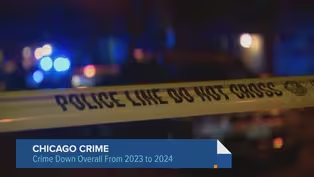Chicago Tonight: Black Voices
Jury Awards $50M to Man Wrongfully Convicted of 2008 Murder
Clip: 9/25/2024 | 8mVideo has Closed Captions
The verdict set a new Chicago record for a wrongful conviction case.
If the verdict is upheld, it would be equivalent to more than 60% of Chicago's annual $82 million budget to cover the cost of police misconduct lawsuits.
Problems playing video? | Closed Captioning Feedback
Problems playing video? | Closed Captioning Feedback
Chicago Tonight: Black Voices is a local public television program presented by WTTW
Chicago Tonight: Black Voices
Jury Awards $50M to Man Wrongfully Convicted of 2008 Murder
Clip: 9/25/2024 | 8mVideo has Closed Captions
If the verdict is upheld, it would be equivalent to more than 60% of Chicago's annual $82 million budget to cover the cost of police misconduct lawsuits.
Problems playing video? | Closed Captioning Feedback
How to Watch Chicago Tonight: Black Voices
Chicago Tonight: Black Voices is available to stream on pbs.org and the free PBS App, available on iPhone, Apple TV, Android TV, Android smartphones, Amazon Fire TV, Amazon Fire Tablet, Roku, Samsung Smart TV, and Vizio.
Providing Support for PBS.org
Learn Moreabout PBS online sponsorship>> Chicago >> man made history when he received a 50 million dollar verdict against the city of Chicago earlier this month, Marcelle Brown was 18 years old when he was convicted of first-degree murder in 2008, he was exonerated 10 years later, he sued the city over his wrongful conviction rather than the case settling.
A federal jury awarded him this record-setting amount.
Here to talk more about his story are exoneree Marcel Brown and Jon Lovi attorney and founding partner of the Civil rights law firm, Lovi and movie.
Thanks to both for joining us.
Thanks congratulations.
In order say congrats for for an award like this more.
So when you learned about the jury's decision, what was what was your reaction?
it mean to you?
>> I was crying.
So when I learned about it, I thought the city of 14 million to my attorney to the meals.
15, so I was shocked.
>> So you miss heard I mean, you are crying over the 14 Million.
And then you learn that it was even more than that.
Yes, lot more.
Yes.
What did it mean to you?
>> I everything to because it was like really the first sign of me getting justice for everything.
I went through.
>> 50 million dollars in justice.
Yes, yeah.
It was a.
>> It was kind of my way of the trial was like my fight to gain my freedom back.
>> I want to come back to because I want to ask John sort of same question to you.
You handle these cases frequently.
We do.
What does 50 million dollars CDU?
>> Well, it's a record.
Nobody single plaintiff has never received that much from a juror in the United States.
And federal or state ever anywhere.
arguably the largest one in history, if not planet, because United States has got more of these than other countries.
So what it says is that this jury saw great injustice here.
You know, Marcel Brown, was 18 years old news convicted of something he didn't do and Chicago's had a problem with wrongful convictions and it seems to be a recurring problem.
And I think people are done with it.
>> Let's back up and share a little bit of your story.
Marcel.
You are arrested at the age of 18 in connection with a murder.
It was a coerced confession that was used to convict.
You first.
What kind of interrogation tactics to the police use?
What happened?
>> Use love practices.
They turn my turn me away.
line kept telling truth it comes >> Well, we don't believe that's the truth.
We want to hear truth.
We know that roof.
We got 20 witnesses seeing this 20 with us and tell them something, though, son.
That's not the truth.
You know more.
You know more.
just kept pressing.
>> Go ahead.
you know, this is a 31 hour interrogation, which is the real outlier.
This is an 18 year-old boy.
He didn't sleep.
They interrogated him all night.
Kept him up the next day.
That confession is like out his second all-nighter.
the conditions were such that they overcame as well.
>> And it gets at what or so.
Did you sort of go from resisting to just say what they want me to say.
>> believe in to only up day 3.
>> That's around.
Which is something that happened or was it just I'm tired.
I was time.
Probably 6 of So exhausted by the time you got 2 minutes to the confession was the mind games that was planned.
So that go here, go there.
List.
I'm gonna go.
You want to go home?
The cast has to go.
>> You say anything say that I'm like that's the truth.
We will more of that roof.
So I don't know what to do.
>> Ultimately, they tracked You know, he's just a child.
These are grown men who have done this 100 times and they made him think that his path out was to cooperate.
You know, he told them videotape many, many times.
This is the truth.
And they made it clear to him.
You're not leaving this room until you tell us a different route.
And that is what's interesting about the case premise is that it was on videotape.
You know, Illinois passed the statute in the early 2, thousands so that we don't have to argue anymore.
What happened in the room as a lot of times people come out of the room like this is what happened.
Police say no, that's not what happened.
Illinois legislature passed a law not just video tape the very end because that's what they would do.
It work with somebody for 30 hours and then get a confession on videotape.
After early 2, thousands, the entire interrogation idiot tape.
So the jury was able to see the whole sequence.
Allentown.
>> So one fast forward a little bit because there's a lot to talk about the limited amount of time.
We know that you spent 10 years in prison before you exonerated, which means you're young when you went to prison John, a question for you.
Many of these cases because we covered this a lot.
City council approving another settlement for another wrongful conviction.
This one didn't settle wintery, which a jury you know, takes 2 sides not to settle, but the city offered less than 3 million dollars.
You know that they did not think they had exposure here.
>> That was a miscalculation.
You know, Marcel could have accepted that are decided he's going to get justice.
And that's what he did.
You know, I realize politically sometimes the city is criticized for suddenly sometimes get criticized for not settling in my opinion.
They don't do a good job of appraising the risk.
They probably should settle more.
Then they do because that, you know, there's a lot of risk a case like this.
>> What did you have to prove that the trials for his constitutional violations and witness manipulation being included?
We had to prove that the police intentionally >> violated his rights.
Not just that he was innocent, but that they had coerced his confession.
That was the primary claimed that they had fabricated evidence.
>> So you were young when you went to prison.
How has that impacted you?
>> All prison kind of say Nguyen.
kind of miss member enough.
suffer from depression.
I came home to And so was like 18 year-old kid coming But I was really a grown man saw came home to a lot of responsibilities.
That I didn't know how to really cope was saddened because I had no experience >> Prison is really no place to grow up.
But when happens only.
The being a man imprisoned, probably us who commit the most violent.
So.
>> In land the free world is.
I had no one to go.
>> Was experiencing this trial difficult for you.
First.
want to go through it, but I want to what they was all fun.
But >> it was like vindictive scum because finally the roof and get to him much roof and you have to face the facts.
Everything in room, So.
I've got just doesn't.
And so the trauma more to me than the 50 million dollars.
This was the opportunity for you to share what happened to you?
Yes, felt like I got a piece in the back.
>> To courage because, you know, they cross examine them all over again.
He had to listen.
The city, Chicago Common murder for 2 more weeks.
And that was a difficult cross-examination because, yes, was.
You know, when he was 18, they did to him in the room.
Now here is a grown man.
They did the same thing to him at the trial and myself handled it beautifully.
And with courage and class on the public record.
>> The amount 50 million dollars that is nearly 60% of what the city of Chicago budgets annually for for wrongful convictions.
Police misconduct cases.
Are you concerned at all that the city try to appeal the award?
They will appeal.
You know, they should have settled the judge a >> recommended that I believe 5 million dollars is judicial recommendation.
The city said no.
We want to pay more than 3.
>> They don't do a real good management.
It's it is a real problem.
There is insurance.
There is insurance.
And so the insurance companies are gonna have to be responsible.
>> We're so what's next for you and your family?
>> Hopefully, a began.
What would you like to do that to on Jews to buy my mom?
beautiful house.
month, Gore to go to my school.
That's
History of House Music Recognized in Uptown Mural
Video has Closed Captions
Clip: 9/25/2024 | 2m 37s | Chicago is known as the birthplace of house music. (2m 37s)
Why Many Americans Don't Believe Violent Crime is Down
Video has Closed Captions
Clip: 9/25/2024 | 8m 55s | Crime is down overall, both in Chicago and across the U.S. (8m 55s)
Providing Support for PBS.org
Learn Moreabout PBS online sponsorship
- News and Public Affairs

Top journalists deliver compelling original analysis of the hour's headlines.

- News and Public Affairs

FRONTLINE is investigative journalism that questions, explains and changes our world.












Support for PBS provided by:
Chicago Tonight: Black Voices is a local public television program presented by WTTW

